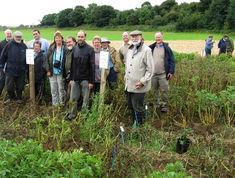
Welsh researchers launched four new varieties of sustainable, low-input potatoes last week in a bid to fight blight problems in the country.
The Sárvári Research Trust (SRT) hosted an open day at its base near Bangor, North Wales, last Friday to debut the new blight-resistant varieties intended for commercial use in the UK.
More than 70 visitors from throughout the UK came to the Henfaes Research Centre to learn about progress in the breeding of Sárpo potatoes with high resistance to late blight disease.
The four new varieties unveiled at the open day were second early Sárpo Una and early maincrops Sárpo Shona, Blue Danube and Kifli.
David Shaw, director of the trust, told visitors how breeding material from the Sárvári family in Hungary is being selected by the SRT for varieties suitable for low-input growing.
He told freshinfo: “The blight-resistant Sárpos have an exceptionally low carbon footprint. These high-yielding varieties resist viruses, have weed-smothering foliage and deep roots for nutrient scavenging and tolerance to drought. Long dormancy means they store without refrigeration into late spring. These are a new generation of potatoes for sustainable cropping and economical growing.”
Simon White, SRT trials manager, told visitors how potential varieties are challenged with new strains of blight, including the highly destructive Blue 13 strain, and how many other characteristics affecting acceptability have to be assessed.
Gary Collins of the Potato Council also addressed delegates and explained how the council is collaborating with BlightWatch to provide growers with up-to-date forecasting of blight and its actual occurrence throughout the UK.
The aim of the trust, formed in 2002, is to study late blight disease and select new blight-resistant Sárpo breeding material, which orginates from Hungary, for growers in the UK.



